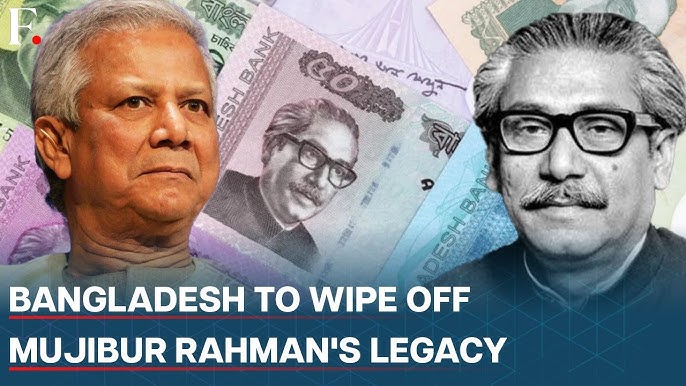The recent developments in Bangladesh reflect a significant shift in the nation’s political and cultural trajectory. The interim government, which emerged following the revolution on August 5, has taken several decisive actions that not only mark the end of Sheikh Hasina Wajid’s era but also signal a departure from the longstanding dominance of Sheikh Mujibur Rahman’s legacy.
End of ‘Joy Bangla’ Slogan
The decision to cease the use of “Joy Bangla” as a national slogan is a symbolic yet impactful move. Historically, the slogan was associated with the liberation movement of 1971 and became a central theme of Sheikh Mujib’s political ideology. By removing this slogan, the interim government appears to be seeking a fresh identity for the nation, distancing itself from the divisive narratives of the past. This shift could pave the way for national unity, fostering an inclusive political environment that avoids polarizing rhetoric.
Removal of Sheikh Mujibur Rahman’s Image from Currency Notes
Removing Sheikh Mujib’s image from Bangladeshi currency notes is another bold decision by the interim government. Currency often serves as a representation of a nation’s history and values. By making this change, the interim government signals a desire to redefine the country’s national identity. The introduction of new notes featuring elements of the recent revolution emphasizes the government’s intent to highlight a new chapter in Bangladesh’s history, focused on modernization and reform rather than past conflicts.
Denial of Sheikh Mujib’s Policies and Sheikh Hasina’s Actions
The interim government’s rejection of Sheikh Mujib’s policies and the governance of Sheikh Hasina marks a shift away from the Awami League’s legacy. This could have significant implications for the nation’s political landscape. While Sheikh Mujib’s era was pivotal for Bangladesh’s independence, the interim government seems intent on addressing grievances tied to perceived authoritarianism, political exclusion, and alleged corruption during Sheikh Hasina’s tenure.
Potential Impact on Pakistan-Bangladesh Relations
The evolving political landscape in Bangladesh holds promising opportunities for improving relations with Pakistan. Historically, ties between the two nations have been strained due to the events of 1971. However, the interim government’s departure from Sheikh Mujib’s divisive rhetoric may allow for a more pragmatic and forward-looking approach to bilateral relations.
- Trade and Economic Cooperation:
With Bangladesh focusing on economic reform, there is potential for Pakistan and Bangladesh to enhance trade ties. Both nations can explore opportunities in textiles, agriculture, and technology sectors, fostering mutual economic benefits. - Shared Regional Interests:
Both Pakistan and Bangladesh face common challenges, such as economic instability, climate change, and security concerns. Collaborative efforts in these areas can strengthen ties and promote regional stability. - Cultural and People-to-People Exchanges:
Moving beyond historical grievances, both nations can focus on cultural exchanges, educational partnerships, and tourism, which can bridge gaps between their populations.
Balancing Regional Politics
The interim government’s policies may also alter Bangladesh’s regional dynamics. Sheikh Hasina’s tenure often leaned heavily toward India, with New Delhi playing a significant role in Dhaka’s domestic and foreign policies. The current changes might open doors for a more balanced foreign policy, allowing Bangladesh to engage with Pakistan and other regional players, including China and the Middle East, on equal terms.
The recent decisions by Bangladesh’s interim government signify a transformative period for the nation. By moving away from the political legacies of Sheikh Mujib and Sheikh Hasina, Bangladesh seems to be embracing a new direction rooted in unity and reform.


